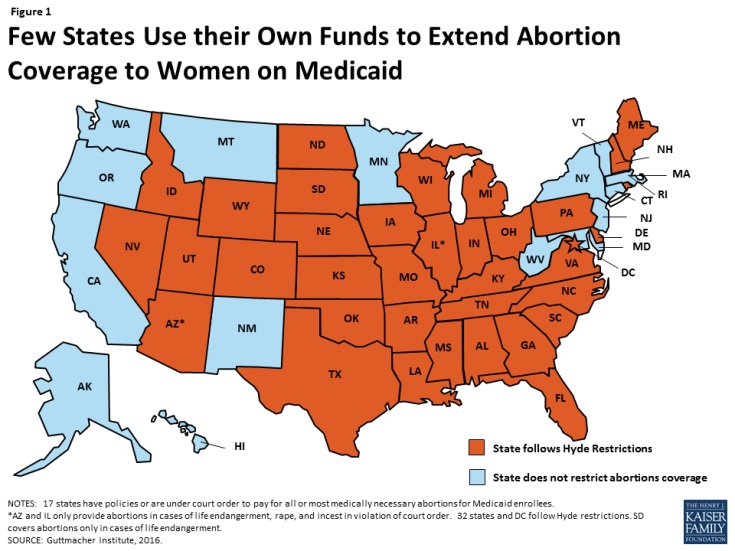Now is the time to repeal a 40-year-old law that perpetuates inequality among women.
The Hyde Amendment, which bans the use of federal funds to pay for abortions except in certain circumstances, is unfair. The amendment targets women who rely on Medicaid for their health care coverage. According to the federal Centers for Medicare and Medicaid Services, roughly two out of three adult women enrolled in Medicaid are between the ages of 19 and 44—the reproductive years.
Abortions can run upward of $1,000, which places the (legal) procedure out of reach for most women living in poverty. Women in poverty rely on Medicaid for their health needs. Vasectomies are covered. Tubal ligations are covered. Abortions are not. When is it ever a good idea to limit health coverage?
For the first time ever, repealing the Hyde Amendment is part of the Democratic party platform, with the support of the Democratic presidential candidate Hillary Clinton— though her running mate, Tim Kaine, is not on board with repeal.
Kaine’s stance is unusual among Democrats. Last month, on the 40th anniversary of the amendment, Connecticut’s Rep. Rosa DeLauro issued a statement that said, in part: “We should never have to acknowledge another anniversary of the Hyde Amendment.” She supports repealing the amendment.
“Whether a woman has private or government-funded health insurance, every family should be able to make their own decisions about reproductive health,” DeLauro said.
U.S. Sen. Chris Murphy also has said he doesn’t like the amendment, and U.S. Sen. Richard Blumenthal has sponsored bills that seek to counter states, such as Texas and Wisconsin, when they attempt to restrict women’s access to abortion.
 The amendment says that unless the pregnant woman is the victim of incest or rape, or her life is in danger, her Medicaid will not cover an abortion. This was not always the case. In the days immediately following Roe v. Wade, Medicaid covered abortions. And then Henry Hyde entered the picture.
The amendment says that unless the pregnant woman is the victim of incest or rape, or her life is in danger, her Medicaid will not cover an abortion. This was not always the case. In the days immediately following Roe v. Wade, Medicaid covered abortions. And then Henry Hyde entered the picture.
Hyde was staunchly anti-abortion, an Illinois Republican, and author of the bill that bears his name. Hyde, who died in 2007, said that he would have preferred preventing all women, no matter their economic status, from having abortions, but “unfortunately, the only vehicle available” was his bill.
Early arguments against the amendment are the same arguments against it now: It unfairly singles out women living in poverty, and puts a legal medical procedure outside their insurance coverage.
The legislation survived a Supreme Court challenge in 1980. Supreme Court Justice Thurgood Marshall wrote in his dissent that the amendment was “designed to deprive poor and minority women of the constitutional right to choose abortion.”
An August Pew Research Center poll said that 56 percent of Americans believe abortion should be legal in at least some circumstances. A quarter said abortion should be legal in all cases. That figure has held fairly steady over the past several years. This while individual states—Connecticut is not among them—have increased restrictions on abortion. This past summer, the Supreme Court struck down a strict Texas law that required abortion clinics to upgrade their facilities to hospital-like standards. Opponents of this law and others have called them “clinic-shutdown laws.”
Legislators introduced the Equal Access to Abortion Coverage Health Insurance Act, or EACH Woman Act in 2015. The act, which has 124 sponsors, provides abortion coverage through Medicaid and would essentially repeal Hyde.
Guttmacher Institute says that roughly half of all U.S. pregnancies are unintended. According to the National Health Statistics Reports, women who are poor and lack an education are more likely to have unintended pregnancies than women with more resources. Hyde places the biggest burden on women who can least afford it. If abortions are legal in this country—and they are—then they should be legal and accessible to all.
Susan Campbell is a distinguished lecturer at the University of New Haven. She can be reached at slcampbell417@gmail.com.
Great post.